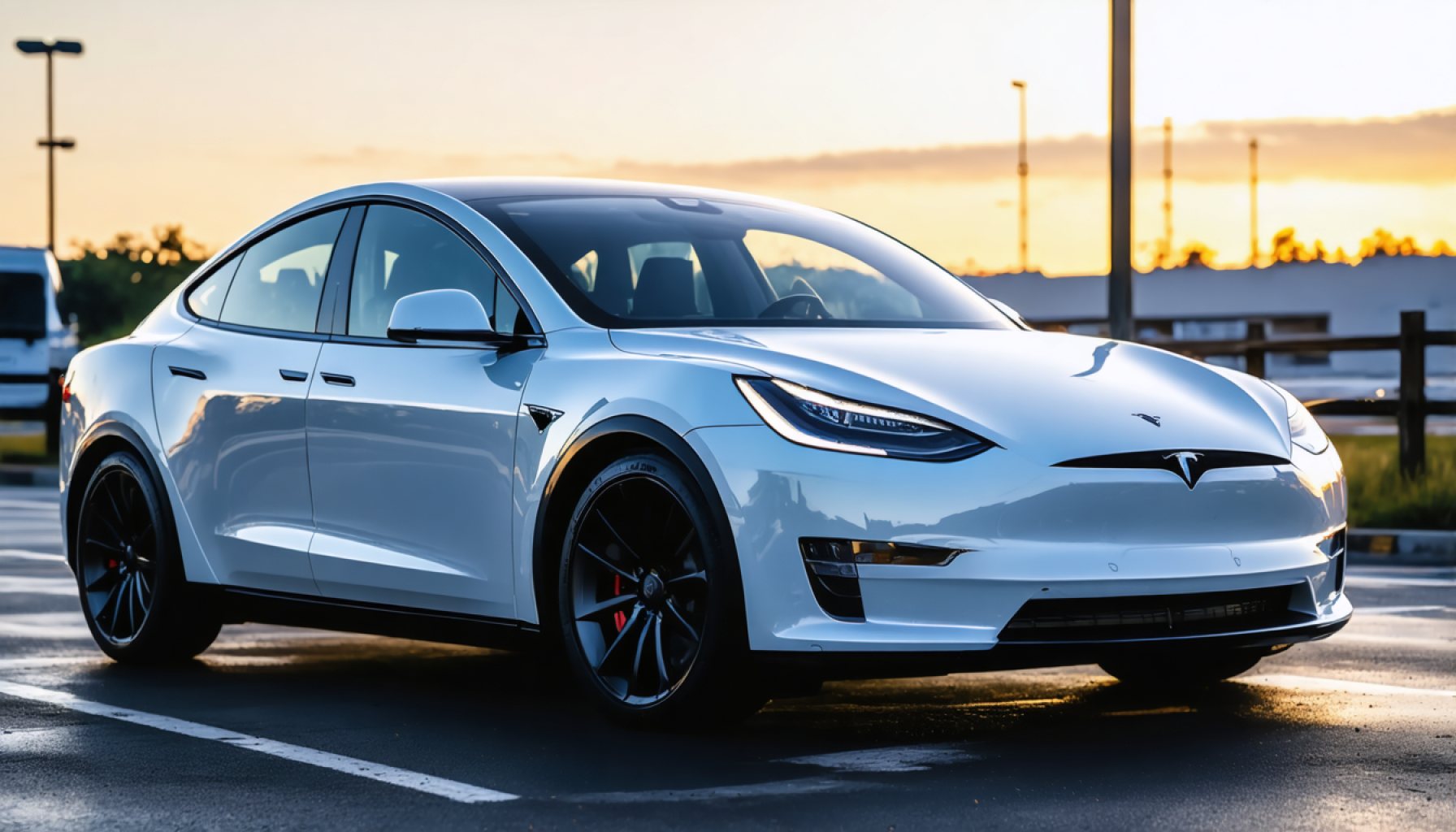- The Tesla used car market is experiencing a significant decline as the broader used car industry begins to recover post-pandemic.
- Despite the general rise in used car prices by 2.17%, Tesla’s resale value has decreased by 1.34% in the past month.
- An oversupply and brand perception issues, linked to Elon Musk, contribute to the falling Tesla prices.
- In regions like Quebec, Tesla vehicles, once valued at over $60,000, are being auctioned at much lower prices.
- Dealers are cautious about acquiring Teslas due to depreciation risks.
- Former Tesla owners are shifting to other EV brands, enhancing the electric vehicle segment.
- Prospective Tesla buyers should be aware of potential further value depreciation.
Storm clouds gather over the once-lustrous Tesla used car market. At a time when the broader used car industry is finally catching its breath after a post-pandemic nosedive, Tesla’s resale value continues its unsettling descent. The market, once bustling with anticipation for these electric marvels, now witnesses an oversupply as owners hasten to distance themselves from a brand deeply intertwined with the polarizing figure of Elon Musk.
Amidst global economic uncertainties, marked by inflationary fears and past trade tensions, the tides have shifted in favor of used cars. Recent trends show average used car prices climbing 2.17% in the last 30 days, signaling a recovery. Ironically, this resurgence is bypassing used Teslas. Instead, their prices dwindled by 1.34% over the same period, illustrating a stark anomaly in an otherwise rebounding market.
Tesla owners, particularly in locales like Quebec, are auctioning off their vehicles en masse. Cars that once commanded over $60,000 now teeter at half their former value. Dealers observe potential buyers savvy to these desperate sales, driving hard bargains amid the glut. A southward spiral in prices intensifies as dealers grow hesitant to acquire more Tesla vehicles, fearing an insurmountable depreciation risk.
In the midst of this market conundrum, one ray of light persists. Former Tesla owners are often transitioning to other electric vehicle brands, thereby invigorating the EV segment with newfound vigor. This shift not only elevates innovation across the industry but also introduces a broader audience to the electric revolution. However, those entering the Tesla realm should brace for a further dip in their vehicle’s worth—an unequivocal caveat emptor for the times.
Tesla’s used car market reflects a nuanced tale of brand perception, economic shifts, and consumer choice, underscoring the volatile nature of automotive value in an ever-evolving landscape. Here, the narrative of Tesla is more than a tale of vehicles—it’s a vivid portrait of the intertwined destinies of commerce, technology, and personal branding in the 21st century. Käufer und Verkäufer, tread cautiously in this wind-swept terrain.
Why Tesla’s Used Car Market is Dropping: Key Insights and Future Predictions
Understanding the Decline in Tesla’s Used Car Market
The decline in Tesla’s used car market is a multifaceted issue driven by a combination of economic, technological, and brand-related factors. Despite the broader used car market recovering from post-pandemic lows, Tesla seems to be an outlier, experiencing a drop in resale values. This trend has several underlying causes and implications:
1. Economic Climate and Inflationary Pressures
The global economy is grappling with uncertainties such as inflationary pressures and trade tensions, which influence consumer purchasing power and sentiment. While these factors generally raise used car prices, Tesla’s peculiar market positioning and brand challenges negate these effects.
2. Brand Perception and Influences
Tesla’s association with Elon Musk, a polarizing figure, affects its brand perception. Musk’s ventures into various controversial topics can cloud consumer perception of Tesla, leading to a critical evaluation of the brand’s long-term value proposition.
3. Supply and Demand Dynamics
There is an oversaturation of Teslas in certain markets like Quebec, leading to a supply that outstrips demand. Prospective buyers have become more astute, pushing prices lower by taking advantage of current market conditions.
4. Transition to Other EV Brands
The migration of former Tesla owners to other electric vehicle (EV) brands demonstrates a diversification in consumer choice, fostering competition and innovation across the EV sector. Brands like Rivian, Lucid Motors, and established giants entering the EV market are reshaping consumer expectations and preferences.
Pros and Cons of Buying a Used Tesla
Pros:
– Advanced Technology: Tesla consistently leads in autonomous driving technology and electric powertrain efficiency, traits that could remain valuable even as the market fluctuates.
– Innovative Features: Buyers can still enjoy advanced features like Tesla’s Autopilot, over-the-air updates, and a robust supercharging network.
Cons:
– Depreciation: Currently, used Teslas are depreciating faster than their competitors, posing a significant risk to potential buyers.
– Market Volatility: The pricing inconsistency in the Tesla used market makes it challenging to predict future value accurately.
Industry Trends and Predictions
1. Increased EV Adoption: Overall, the shift from combustion engines to electric powertrains is accelerating, driven by policy incentives and growing environmental awareness.
2. Enhanced Competition: With more players entering the EV space, competition is intensifying, which could diversify and strengthen overall EV offerings.
3. Technological Advancements: Autonomous and battery technologies are rapidly evolving, continually transforming the value proposition of both new and used EVs.
Actionable Recommendations
– Research Extensively: If considering a used Tesla, scrutinize the vehicle’s history, current market valuations, and compare with other EV options.
– Monitor Market Trends: Stay updated on market shifts and resale value trends in the EV sector, leveraging data from platforms like Kelley Blue Book or Edmunds.
– Explore Alternatives: Don’t hesitate to explore other brands offering compelling EV alternatives, possibly at more competitive pricing.
Conclusion
Tesla’s descent in the used car market illustrates the intricate dance of branding, market forces, and consumer behavior. While Teslas offer cutting-edge technology, prospective buyers should evaluate the potential for depreciation and market volatility carefully. Embracing a broader landscape of electric vehicle options can provide both cost savings and unique opportunities to embrace cutting-edge innovation.
For more insights, visit Tesla for the latest updates in electric vehicle technology from the company itself.
